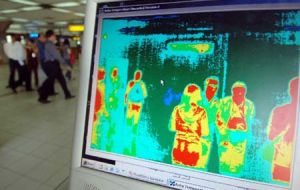MercoPress. South Atlantic News Agency
Uruguay imposes sanitary controls at Argentina and Brazil borders

Uruguay extended sanitary controls to borders with Argentina and Brazil following the confirmation of several cases of the influenza A/H1N1 in its neighbouring countries, the first to be reported in Mercosur.
arriving to Uruguay by sea or air, will be imposed on all frontier passes with Argentina and Brazil.
These controls are basically body temperature tests with thermo graphic cameras plus a simple questionnaire detailing recent trips and a phone number where the traveller can be monitored regularly on any of the possible symptoms.
The A/H1N1 flu virus takes approximately ten days to manifest itself after contagion.
So far the procedure was only applied on travellers arriving at the Carrasco international airport from Mexico, United States and Canada, said Villar.
The Uruguayan official described the contingency plan as “dynamic” and if needed “further measures have been planned and will be applied”. Uruguay’s response followed Argentina’s Thursday announcement of one “imported” confirmed case and four in Brazil.
Uruguay so far has three persons at their homes under surveillance, one of them Mexican who arrived from Mexico and had some mild symptoms of the virus disease. However it was later confirmed that the cases were seasonal flu, quite common at the beginning of winter in Uruguay.
Uruguayan sanitary authorities also decided that all sanitary and heath personnel in the frontier passes must be vaccinated against seasonal flu and must use sanitary masks and discardable gloves.
Uruguayan Public Health minister Maria Julia Muñoz said that the seasonal flu vaccine is not effective against the A/H1N1 strain but can help mitigates its effects if the virus finally makes it into Uruguay.
Meanwhile from Geneva the World Health Organization, WHO, said that at 16:00 GMT, 8 May 2009, 25 countries had officially reported 2500 cases of influenza A (H1N1) infection.
Mexico has reported 1204 laboratory confirmed human cases of infection, including 44 deaths. The United States has reported 896 laboratory confirmed human cases, including two deaths. The following countries have reported laboratory confirmed cases with no deaths: Austria (1), Brazil (4), Canada (214), China, Hong Kong Special Administrative Region (1), Colombia (1), Costa Rica (1), Denmark (1), El Salvador (2), France (12), Germany (11), Guatemala (1), Ireland (1), Israel (7), Italy (6), Netherlands (3), New Zealand (5), Poland (1), Portugal (1), Republic of Korea (3), Spain (88), Sweden (1), Switzerland (1) and the United Kingdom (34). WHO is not recommending travel restrictions related to the outbreak of the influenza A (H1N1) virus.




Top Comments
Disclaimer & comment rulesCommenting for this story is now closed.
If you have a Facebook account, become a fan and comment on our Facebook Page!